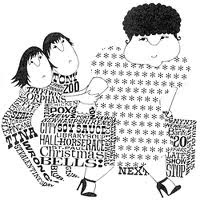I haven't read other people's posts on the last chapter of HAoH yet, but I predict their reactions will be much like they were to the previous one: "not what I was expecting." The last two chapters of the book don't really draw the whole picture of Hidden Art together as fully as we might desire. Was that on purpose, or did Edith just peter out? The last chapter in particular is surprisingly short. It's like getting to the end of a mystery book a little too suddenly...say one of the nutty ones by Ellen Raskin...and wanting to go back and comb through the final chapter for any clues that you missed.
So are there any?
First, there's one of the recurring threads: "There is no place where one cannot plant ivy over the mud hut and put a flower on the stump....I am sure that there is no place in the world where your message would not be enhanced by your making the place (whether tiny or large, a hut or a place) orderly, artistic and beautiful with some form of creativity, some form of 'art.'"
And then the idea that "we [ourselves] are an environment for the other people with whom we work, the people with whom we communicate. And in this sense we do not choose an art form and create something in that form; we are an art form...an art form God can use in this area of environment."
As others have pointed out, Edith always comes back to communication, a message.
Is the message we are living clear, or is it a lot of "glub-blubs?"
Are we hiding our real identities and gifts? Leaving clues on bits of paper towel, or doing something more?
"We should be artists in...doing something practical to show that expectancy [that God can intervene]...affects the attitudes other people are going to have to their troubles."
Mr. Banks carved the turkey; the plates were passed and filled high to overflowing; and Mrs. Carillon asked Augie Kunkel to say grace.
Augie Kunkel didn't know how to say grace. He just named the dishes and let the delicious smells inspire the proper reverence:
Patate douce, dindonneau truffée, airelles en couronne, petits oignons, pointes d'asperges au beurre, purée de marrons.
"Amen," said Mr. Banks, who didn't understand French; and the eating and the chatting and the celebrating began. ~~ Ellen Raskin, The Mysterious Disappearance of Leon (I mean Noel)




No comments:
Post a Comment